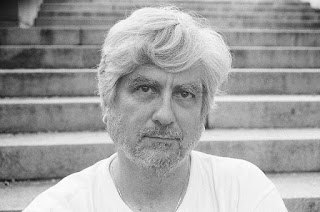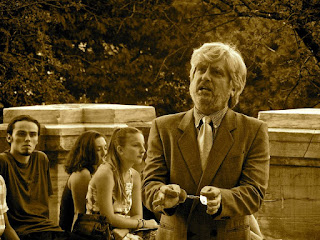 |
| A typical rehearsal look. |
 |
| Jack played R3, from his own adaptation, and directed the thing too. I was thrilled to be invited to play his Buckingham. |
My first encounter with the hunchback who had misplaced his horse was back in <gulp> 1999. My buddy Jack Young, at the time the artistic director of the Warehouse Theatre in Greenville, SC, invited me to join his production of the play, in which he was to both star and direct. It was a herculean task, in my opinion, but if anyone could accomplish it, Jack was the man.
My grad school comrade Christina Keefe, Jack's wife and the leading lady of his theatre, had suggested he hire me for the show. I was told that my name first came up to play the small comic role of the Mayor of London; Christina wondered why Jack would waste me on such a minor character, considering he would have to hire me as an out of town actor, and provide lodging and transportation for me as well.
 |
| This gal played the Mayor, a role I was later to play. Twice. |
 |
| Buckingham ends the play being led to his execution. This photo was on my Christmas Card that year. |
I have to admit that I don't have many specific memories of the experience at The Warehouse. I recall I spent a lot of time working the text; Buckingham was the largest Shakespearean role I had played to date. He is definitely one of those roles which I would like to attempt again, now that I'm more <ahem> seasoned.
 |
| Our star was not the only one with a hump. Our stage had one too. We played in-the-round, with a misshaped hill in the center as the defining scenic element. |
Fourteen years later, Richard III reentered my life.
I had only been in my New York apartment a few months when I responded to a casting call for Hudson Warehouse, a company which produced classic (mostly Shakespeare) shows outside in Riverside Park.
 |
| I never really adjusted to the weather issues, but I have to admit, when the sun is setting on your face, it gives the performance a glow which I've never felt from artificial lighting. |
 |
| The playing space used by Hudson Warehouse is huge, well-suited for big Shakespearean epics (if not for acoustics, which are as you might imagine). I wrote about trying to meet the challenges of this space here and here. |
 |
| As the clueless Mayor of London. |
Clarence has a strong dramatic presence in the early scenes of R3, including a speech about a dream, full of imagery and dramatical moments. After this speech, Clarence is murdered, but not without a fight (and plenty of blood. Hudson Warehouse loves to work with blood). I loved the fact that, in our version, Clarence did not simply accept his fate, but instead fought back as best he could. His slaughter was inevitable, and very fun to play.
After this very bloody scene, I cleaned up myself as best as possible in order to return to the stage as the Mayor, perhaps the only specifically comic role in Richard III. After getting a few laughs in a few scenes, I donned the bloody t-shirt in which Clarence had been murdered in order to reappear as his ghost, haunting his brother. The juxtaposition of these two roles, one dramatic and one comic, was great fun to play, making this my favorite overall experience with any of my R3s.
My third go-round with Richard III ended only a few weeks ago.
 |
| Let's Partaay! Titan's production also opened with the royals celebrating their success, before brother Richard hobbles on to spoil everyone's fun. |
I was once again to play the Mayor; this time the role was doubled with that of Brakenbury, a minor official in the royal court whose primary duties seemed to be keeping the keys to the Tower.
I brought a few new touches to the role of the Mayor, but overall, my performance in Titan's Richard III was not one to celebrate. It was the most limited amount of stage time I had experienced since playing a nameless fishseller in Volpone at the Shakespeare Theatre Company back in 1996. I had to admit that I was working my way DOWN the ladder of importance, role-wise, in this play: from the costarring villain Buckingham in my first R3, to the satisfying supporting role of Clarence in my second R3, to the most recent endeavor playing that guy who is always hanging around on the sidelines.
 |
| Another backstage selfie: Lord Brakenbury. We were not a good match. |












































,+Olney+Theatre+Center,+2004.jpg)



,+Shakespeare+Theatre+Company,.jpg)


,+Warehouse+Theatre,+1999.jpg)
,+Are.jpg)
,+Everyman+Theatre,2002.jpg)
,+First+Nationa.jpg)
,+Shakespeare+Theatre+Company,.jpg)






,+Granada+Th.jpg)
,+Globe+Playhouse,.jpg)
,+CSUN,+1976.jpg)


